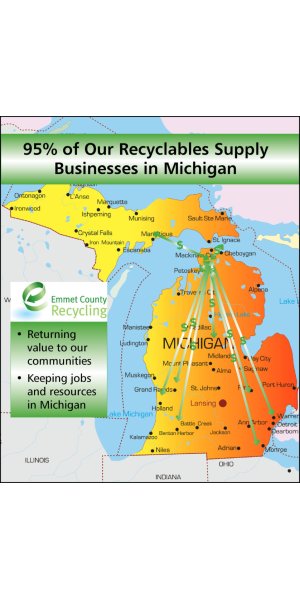FAQ: What does China’s ban mean for my recycling?

No matter where you get your news, you have probably heard there is something up with China and recycling. Here’s the behind-the-scenes, local scoop.
Do my recyclables go to China?
No, materials recycled through Emmet County Recycling have always been used by manufacturers in North America. Even better: 95% of the recyclables we handle supply a Michigan business! The remaining 5% currently go to Illinois, Ontario, and Virginia.
Are my recyclables being landfilled?
No, Emmet County Recycling has never landfilled more than trace amounts (for example bits of broken glass that fall through sorter screens) of any recyclables.
Your recyclables make their way to roughly 23 different factories to be made into new products and packaging. For instance, your water bottles get made into new Absopure water bottles by CleanTech/Plastipak in Dundee, Michigan.
However, please be aware that if you put items NOT listed as recyclable in our Recycling Guide and/or on EmmetRecyling.org in the recycling bins they will be landfilled. Removing non-recyclable items and landfilling them is labor intensive and a drain on the recycling system. So, “if in doubt, throw it out.” Or better yet, do a search at EmmetRecycling.org!
So what’s this about a glut of recyclables because of China?
Many American recycling systems did ship a great deal of recyclable material to China. Now they can’t and material is backed up on the coasts.
U.S.-China trade in recyclables took off in part because Chinese factories were willing to work with dirty materials with a high proportion of garbage in the mix. As time went on under this scenario, many recycling systems didn’t feel the need to communicate to customers effectively about what was and wasn’t recyclable or bother sorting out non-recyclables. Some “made recycling convenient” by accepting just about anything.
The upshot was that some “recyclables” exported to China were so contaminated they were essentially trash. And just like Michiganders have protested being a dumping ground for garbage from neighboring states and provinces, the Chinese didn’t want to take the world’s trash anymore. As part of a national effort to clean up their environment and reduce pollution, China banned the import of all but the most pure recyclables.
Is the Chinese ban on importing recyclables going to affect our recycling system?
The Chinese ban will not affect the materials we accept for recycling. However, the price per ton we get when we sell* the recyclables depends on good ol’ “supply and demand.” Programs which previously sent their recyclables to China are now looking to sell them in North America which is creating oversupply and driving down the value of most recyclables. We expect this to significantly reduce the revenue from the sale of recyclable—a major source of funding** for the recycling program.
We have an advantage in this scenario because—thanks to your sorting—we produce cleaner commodities than most of these programs. Factories seek out our clean materials and pay a premium for them. Their value is still affected by commodities markets, though, so we may have some lean years coming up!
Emmet County Recycling is prepared to weather low markets: in addition to what we earn from the sale of the recyclables, we also draw some funding from what is paid to dump garbage at the county Waste Transfer Station.

What can I do to help?
You can help us keep costs down in 3 ways:
- Only recycle the materials we list as recyclable in The Recycling Guide. Lists of more specific items can be accessed by using the search function at EmmetRecycling.org.
- Bag your plastics bags and place them in the Paper, Boxes and Bags bin.
- Flatten all cardboard so we can transport it efficiently.
For more on how Emmet County Recycling is funded visit the following pages:
